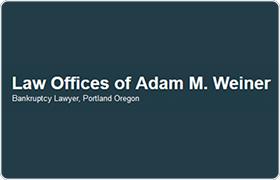Gladstone Workout Lawyer, Oregon
Sponsored Law Firm
-
 x
x

Click For More Info:
-
Law Offices of Adam M. Weiner
8624 SE 13th Ave Portland, OR 97202» view mapBankruptcy & Debt Premier Bankruptcy Attorney
Life doesn’t always have to be hard. Consult with a bankruptcy attorney who looks out for your best interests. Call today to begin the process for a fresh financial start.
503-719-5123
Not enough matches for Gladstone Workout lawyer.
Below are all Gladstone Bankruptcy & Debt lawyers.
Adam M. Weiner
✓ VERIFIED *Status is reviewed annually. For latest information visit hereBankruptcy & Debt, Credit & Debt, Collection
Adam Weiner has been practicing law in Oregon since May 1998. After successfully spending many years representing individuals in different types of... (more)
Todd N. Wilkinson
Bankruptcy, Consumer Protection
Status: In Good Standing *Status is reviewed annually. For latest information visit here
FREE CONSULTATION
CONTACTMatthew A. Casper
Litigation, Consumer Protection, Dissolution, Commercial Bankruptcy
Status: In Good Standing *Status is reviewed annually. For latest information visit here
FREE CONSULTATION
CONTACTHunter B. Zook
Real Estate, Bankruptcy, Bankruptcy & Debt
Status: In Good Standing *Status is reviewed annually. For latest information visit here
FREE CONSULTATION
CONTACTJoseph Quincy Kaufman
Business, Intellectual Property, Estate, Bankruptcy & Debt
Status: In Good Standing *Status is reviewed annually. For latest information visit here Licensed: 38 Years
Sarah Anne Rockwell
Family Law, Business & Trade, Consumer Bankruptcy, Personal Injury
Status: In Good Standing *Status is reviewed annually. For latest information visit here Licensed: 14 Years
Larry J Lunas
Commercial Real Estate, Real Estate, Trusts, Bankruptcy
Clayton Hess
Real Estate, Wills & Probate, Commercial Bankruptcy, Family Law
Status: Suspended *Status is reviewed annually. For latest information visit here Licensed: 77 Years
 Adam M. Weiner Portland, OR
Adam M. Weiner Portland, OR Practice AreasExpertise
Practice AreasExpertise
